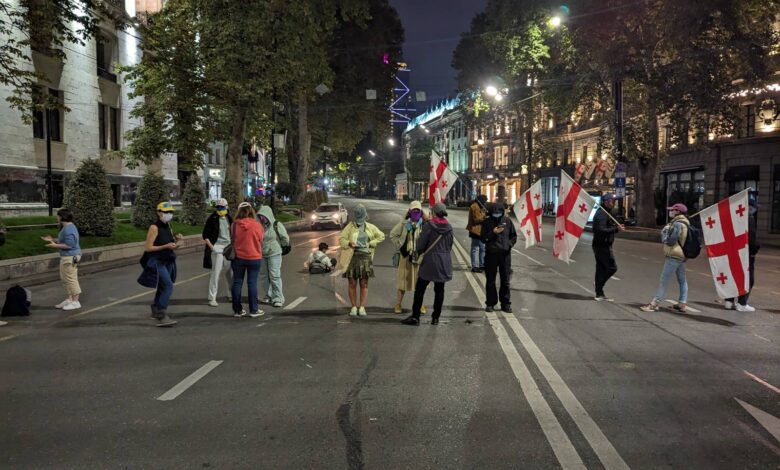
CSOs: Georgian Dream Toughening Laws to ‘Ban Peaceful Protest’
Around 30 Georgian civil society organizations have denounced the ruling Georgian Dream party’s latest legislative proposal to toughen penalties for protest-related offenses as an “attempt to ban peaceful protest” and “another step toward dismantling democratic institutions” in the country.
Georgian Dream announced on October 13 that it would introduce harsher administrative and criminal penalties against protesters for actions such as covering their faces during rallies, blocking roads, and participating in assemblies that officials have ordered to terminate. In many cases, the offenses, when committed for the first time, would be punishable by up to 60 days in detention, with some repeat violations carrying prison sentences of up to one or two years.
“With these changes, the government sends the same threat to everyone: ‘If you raise your voice, you will be arrested,’” the 25 CSOs said in an October 14 joint statement.
“With these changes, the government is trying to ban any form of protest,” the organizations said, adding, “Such legislation is alien to the democratic world and directly contradicts the Georgian Constitution and the European Convention on Human Rights and Fundamental Freedoms.”
“This initiative does not concern only politically active groups – it will affect every Georgian citizen who publicly demands justice, voices outrage over corruption, protests unlawful detentions or unfair verdicts, criticizes poor infrastructure or lack of social protection, seeks to defend women or children from violence, or raises their voice to protect the environment, among others.”
The Georgian Young Lawyers’ Association (GYLA), a human rights group, said in its separate statement that the new legislative initiative aims to “restrict the ongoing daily protests on Rustaveli [Avenue].” The group added that with the changes, the GD government “establishes ‘legalized injustice,’ thereby undermining the principles of the rule of law.”
Anti-government and pro-EU protests have been ongoing in Georgia since November 28, 2024, when the Georgian Dream government, following the much-disputed parliamentary elections of October 26, announced a halt to the country’s EU accession process. Demonstrators have since been gathering for more than 320 days on Tbilisi’s main Rustaveli Avenue, blocking traffic near the Parliament building each night. The number of protesters, however, has been dwindling in the months following the initial massive turnout.
Since the October 4 election-day tensions in the capital, when part of a large rally, at the organizers’ call, attempted to storm the presidential palace, leading to police dispersal, clashes, and unrest, dozens of participants have been arrested, while the ruling party has pledged a harsh response and vowed to end the wider peaceful protests.
In an October 6 interview, Georgian Dream PM Irakli Kobakhidze pledged “methodic and systemic” steps and “zero compassion” towards what he said were 100 “foreign agents gathering at the rallies.”
Speaking to journalists today, the day after the announcement of new legislative changes, Kobakhidze said, “Our legislation, in line with international standards, has long stated that if the number of people is not enough to block a street, they should respect other members of society and refrain from doing so.”
“But as you can see, until now there were only fines, and those fines were not fully effective. Therefore, amendments are being introduced to both the administrative and criminal codes of Georgia to prevent the minority from oppressing the majority,” he added.
“This is the expression of a democratic principle.”
Also Read:
This post is also available in: ქართული